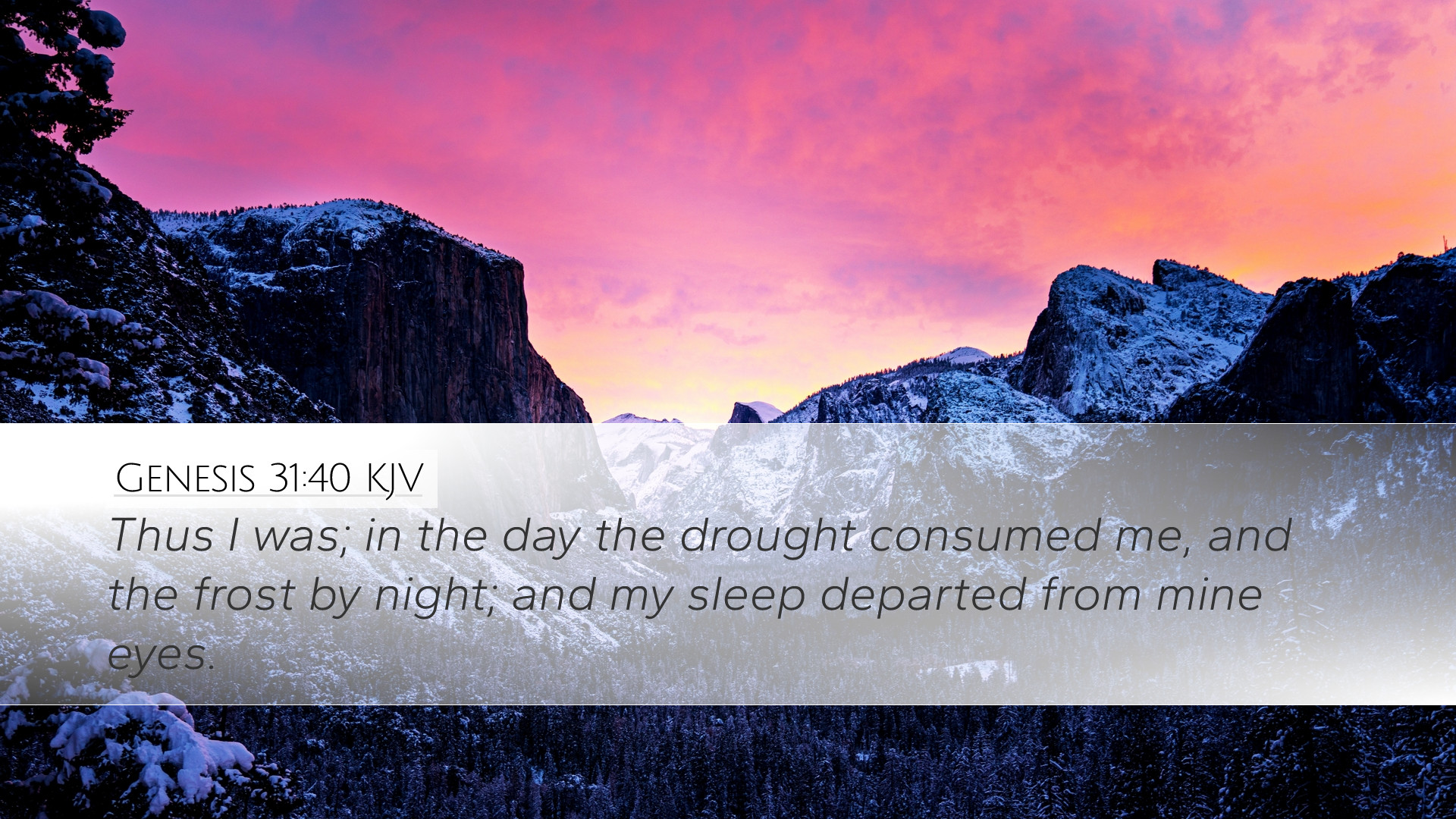Genesis 31:40 Commentary Summary
Verse: Genesis 31:40 - "Thus I was; in the day the drought consumed me, and the frost by night; and my sleep departed from mine eyes."
Introduction
This verse occurs during a critical moment in the narrative of Jacob's departure from Laban. It encapsulates the hardships Jacob endured while tending Laban’s flocks, presenting a poignant reflection on personal sacrifice and the struggles inherent in striving for one's own prosperity.
Contextual Analysis
Jacob's proclamation marks his defense against Laban's accusations. Laban had unjustly claimed credit for Jacob's success and the prosperity of his flocks, while Jacob recounts the bitter realities behind his diligent work.
Historical Background
Jacob had worked for Laban for twenty years, and during this time, he faced constant challenges, including the deceptive practices of Laban and the demands of a harsh environment.
Commentary Insights
Matthew Henry's Commentary
Matthew Henry highlights the emotional weight of Jacob's words, illustrating the labor and trials endured under Laban. He notes that Jacob's lament over the "drought" and "frost" symbolizes the varying challenges one faces in life. Henry interprets Jacob's experience as a testament to the steadfastness required in the journey of faith. He emphasizes the commitment Jacob displays, demonstrating both physical and mental resilience.
Albert Barnes' Commentary
Albert Barnes focuses on the phrase "my sleep departed from mine eyes," explaining it as a vivid expression of Jacob's sleepless nights resulting from worry and stress. He contextualizes this within the broader theme of divine providence, suggesting that Jacob's struggles were not in vain as they ultimately led to God's blessings. Barnes encourages readers to reflect on their own journeys, reminding them that hardships often precede triumphs and divine favor.
Adam Clarke's Commentary
Adam Clarke elaborates on Jacob's statement by stressing the duality of his experience—both physical and spiritual. Clarke observes that while Jacob faced external challenges, these struggles also served to strengthen his character and faith. He underscores the idea that God often allows trials to refine His people, shaping them to fulfill His purposes. Clarke encourages believers to maintain faith during their own trials, as they too have a divine purpose.
Theological Implications
This verse provides rich theological implications regarding human suffering, divine oversight, and the character of God in the lives of His followers. It portrays a realistic picture of the believer's life where struggle precedes blessing. The emphasis on Jacob's toil juxtaposes human effort with God's providential care, suggesting that while believers work diligently, they ultimately rely on God's sovereignty for success.
Human Effort and Divine Providence
The balance between human effort and divine intervention is a recurring theme in Scripture. Jacob's labor symbolizes the diligence expected of believers, while the subsequent blessings serve as a reminder that it is God who grants success.
Endurance through Trials
The mention of the "drought" and "frost" serves as a metaphor for the spiritual and physical adversities believers may encounter. It invites a deeper understanding of what it means to endure hardships for a greater purpose, echoing the sentiments found throughout Scripture, such as in James 1:2-4, where trials are seen as opportunities for joy and growth.
Lessons for Pastors and Theologians
Pastors can draw from Jacob’s narrative to teach congregants about perseverance and faithfulness amidst trials. They may highlight how God can use difficult circumstances to refine character and increase reliance on Him. This narrative also provides valuable insights for theological discussions on suffering, encouraging deeper exploration of how believers can find meaning in their struggles.
Conclusion
Genesis 31:40 poignantly captures Jacob's lament over the trials associated with his labor. This verse serves not only as a historical account but also as a rich source for theological reflection, encouraging those who grapple with their own burdens to trust in God’s providence and purpose. It reassures believers that their struggles, while challenging, are not purposeless and contribute to their spiritual maturity.


